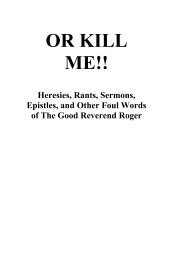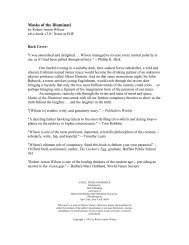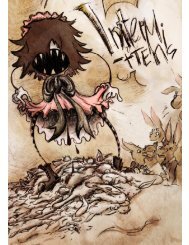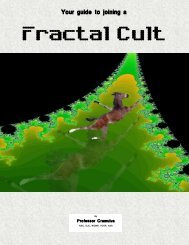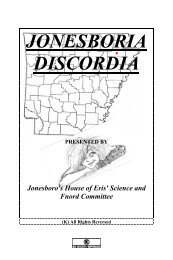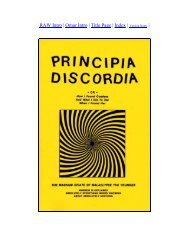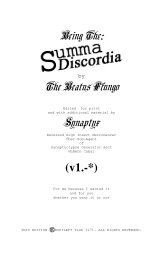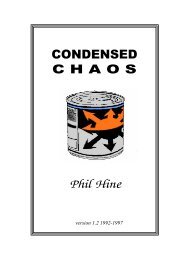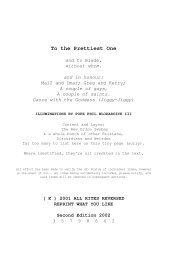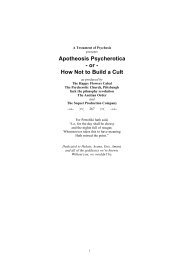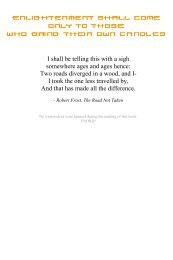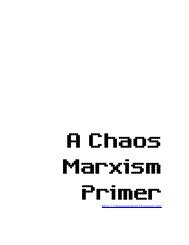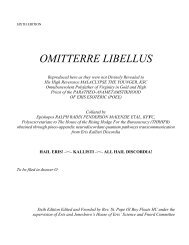Coincidance - Principia Discordia
Coincidance - Principia Discordia
Coincidance - Principia Discordia
You also want an ePaper? Increase the reach of your titles
YUMPU automatically turns print PDFs into web optimized ePapers that Google loves.
COINCIDANCE 149<br />
2. When Norman Mailer began his novel Barbary Shore there was no<br />
Russian spy in it. As he worked on it, a Russian spy became a minor<br />
character. As the work progressed, the spy became the dominant character.<br />
After the novel was finished, the Immigration Service arrested a man who<br />
lived one flight below Mailer in the same building. He was Colonel Rudolf<br />
Abel, named as the top Russian spy in the United States at that time.<br />
CRACKING THE CODE?<br />
3. While the Allies were planning the Normandy invasion of June 6, 1944,<br />
the following code words were used (and were among the best-kept secrets<br />
of the war): Utah and Omaha, the beaches where the American troops would<br />
land; Mulberry, the artificial harbor to be used after the landing; Neptune, the<br />
naval operations plan; Overlord, the entire invasion. On May 3, 1944, the first<br />
code word, Utah, appeared as an answer to the London Dady Telegraph<br />
crossword puzzle. On May 23, Omaha appeared in an answer to a Telegraph<br />
puzzle. On May 31, Mulberry appeared. And on June 2, four days before the<br />
invasion, Neptune and Overlord both appeared.<br />
British Intelligence investigated this matter extensively. They found that<br />
the man who created the crosswords was innocent of espionage, had no<br />
knowledge of the invasion and was as puzzled as they were. Verdict: mere<br />
coincidence.<br />
4. When Hart Crane was living in Brooklyn Heights, he decided to write a<br />
poem about the Brooklyn Bridge, which he could see from his window. It is<br />
the poem for which he is chiefly remembered. Only a year later did Crane<br />
discover that the address where he had lived while writing The Bridge was the<br />
address at which Washington Roebling, chief engineer on the bridge, had lived.<br />
5. One day in 1909, Sigmund Freud and Carl Jung were in Freud's study,<br />
having an argument about extrasensory perception. It is worth noting that<br />
Freud was Jung's hero, virtually his substitute father, at that time. As the<br />
argument grew heated, emotions crackled. Suddenly, for no obvious<br />
reason, there was an explosive noise from Freud's bookcase.<br />
"There," said Jung, "that is an example of a so-called catalytic phenomenon."<br />
"Oh, come!" Freud exclaimed. "That is sheer bosh."<br />
"It is not," Jung answered, seized by an uncanny certainty he could not<br />
explain. "You are mistaken, Herr Professor. And to prove my point, I now<br />
predict that in a moment there will be yet another loud report!"<br />
Boom! It happened just as Jung predicted. Freud was aghast, and Jung was<br />
gripped by an inexplicable guilt.<br />
6. Sequel to the above: In 1972, Dr. Robert Harvie, a psychologist at<br />
London University, was reading aloud to a friend Jung's account of the<br />
experience. When Harvie came to the second explosion in Freud's bookcase,<br />
a lamp inexplicably fell over with a loud crash.



